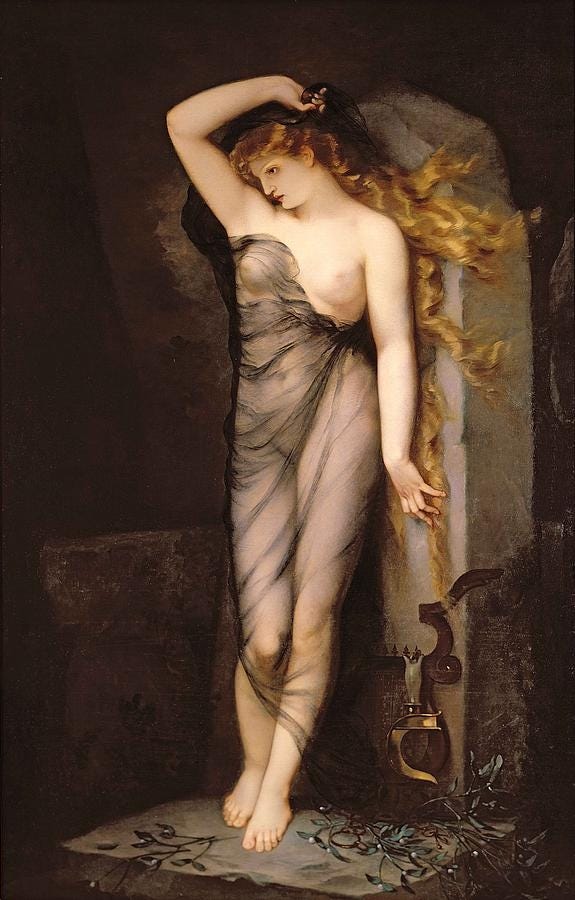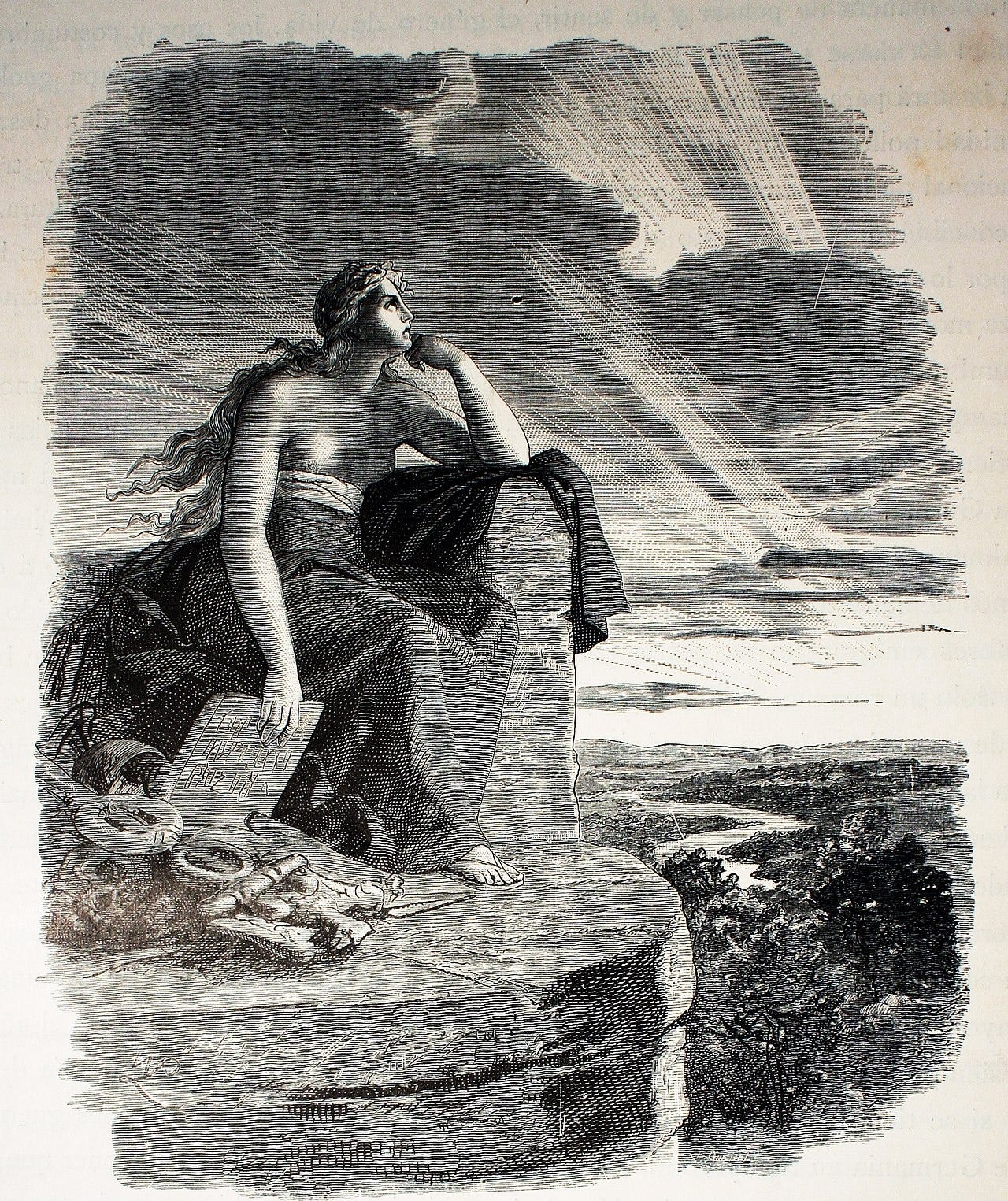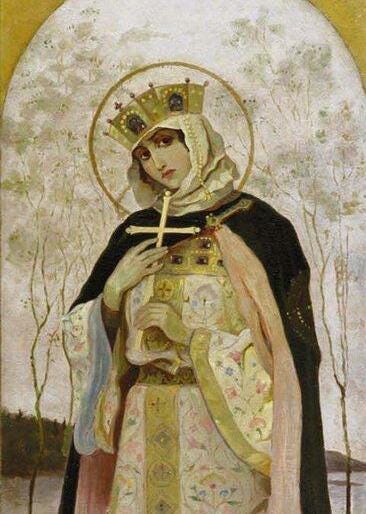This ability has been known for thousands of years, and once upon a time it was celebrated. In fact, some women were so good at it, that enemy nations would attempt to invade to either kill them, or take them. This unique ability was seriously advantageous in warfare, and in the way of politics. So much so, that countries all over the ancient world had their very own rank or title for these women. No I'm not talking about the kings mistress, these women would have been so highly revered that not even a king could take them as a lover, at least not against their will.
The Germanic tribes, Romans, Greeks, Baltic Peoples, and many more depended on these women. Whether they were called Volva, Vitki, Oracle, Seeress, by themselves, or in groups where they would have been known as Witches, Nornes, Fates, or one of many other names, these were in a way the most powerful women on earth in their day.
Veleda, by Painter Charles Voillemot (1823-1893)
Veleda The Bructeri Princess.
One of the most famous Volva in recorded history, was named Veleda. She was a princess of the Bructeri tribes, and in 69 - 70 AD she predicted the victories of the local Tribes over the Roman invaders. In fact, the whole of the Batavian Rebellion, especially it's early successes were accredited to her. Her predictions were so accurate, down to the location, and method of Victory that it was obvious Veleda had some divine insight. Even the historical Authors, and Roman Historians Tacitus, and Cassius Dio, both wrote of her skills and her revered station among her people.
“Veleda was an unmarried woman who enjoyed wide influence over the tribe of the Bructeri. The Germans traditionally regard many of the female sex as prophetic, and indeed, by an excess of superstition, as divine. This was a case in point. Veleda's prestige stood high, for she had foretold the German successes and the extermination of the legions.
They even believe that the female sex has a certain sanctity and prescience, and they do not despise their counsels, or make light of their answers. In [the emperor] Vespasian's days we saw Veleda, long regarded by many as a divinity. In former times, too, they venerated Aurinia, and many other women, but not with servile flatteries, or with sham deification”
Tacitus - Germania 98 AD
In his writing, Tacitus eludes that many other women were revered Volva by the Germanic tribes, namely Aurinia. She however did not have the “Deification” by her people that Veleda was known to have had.
Veleda had a large stone tower and fortress built for her protection, it rested somewhere along the Lippe river. Perhaps it lies somewhere near the old castle at Falkenburg, it's proximity to the Lippe river, and the Teutoburg forest makes it a definite possibility. In another book by Tacitus, The Histories, Book 5 - The Collapse of Civilis, he details the Batavian Rebellion in much detail. He describes a battle on the Rhine where several Roman warships, including their current Roman Flagship had been stolen by the Batavian, and Bructeri rebels of Germania.
The Stolen Flagship of Rome was sailed up the Rhine to the Lippe river, then sailed up the Lippe to be delivered to Veleda as an gift.
Veleda, prophetess of the Germans,
by Juan Scherr (1882)
Throughout the centuries following Veleda a handful more of these Volva show up in history.
Olga of Kiev
Before her possible forced baptism in 950 AD, she was Queen to Igor I of Kiev. Olga was Born in Pleskov as a Varangian or Germanic Pagan. She was a well known priestess of Freya (Völva) and her visions were well accounted. After her husband's Death, Olga travelled all the way to Constantinople, and met with Constantine VII. During this visit, the emperor was so bewitched by Olga that he made at least 2 proposals of marriage. After the first proposal, Olga made an attempt to leave the Emperor and head home to her son Prince Sviatoslav The Brave.
Her cunning led her to devise a plan to avoid marrying the Emperor. She agreed to a baptism, but only one performed by the Emperor himself. After he agreed and baptized Olga, he made his second proposal. This time she refused citing that a marriage between a Goddaughter and her Godfather would be incestuous and for that reason she had to say no.
The second proposal having been public, was not taken well by the Emperor. He had to let Olga return home to her son, as she was the current Regent of Kiev, but not before making her swear to attempt to convert him to the Emperor's own Religion, Christianity.
Whether she really tried or not is unknown, but we do know that Sviatoslav remained Pagan.
From tho Oracle of Delphi, to the Norse Nornes, and the Fates of the Romans, women have been leading the decisions of the world through their prophetic visions. This practice existed for a far larger portion of our history than most people realize. In fact, if this topic interests you, I suggest wearing a tether so you don't get lost down the rabbit hole.
Links And Sources :
https://www.livius.org/articles/person/veleda/
https://www.medieval.eu/the-volva-the-norse-sorceress/#:~:text=As%20the%20central%20figure%20of,somewhat%20peculiar%20members%20of%20society.
https://www.ancient-origins.net/history/feared-and-respected-old-norse-v-lva-sorceresses-009197








It is a potential, IF they cultivate their consciousness. Getting beyond the infantile impulses this culture now encourages is difficult, and few women are interested in it. I think, people in the north have an advantage. the long winters, allow for contemplation and refinement of the human consciousness. while closer to the equator this is not really a thing.